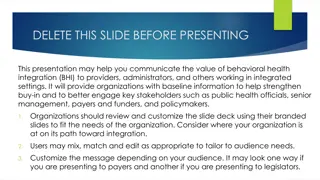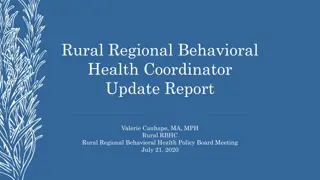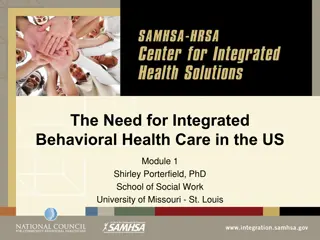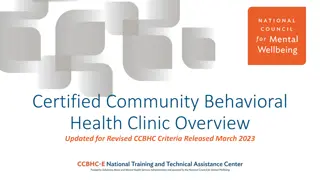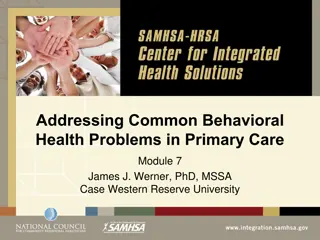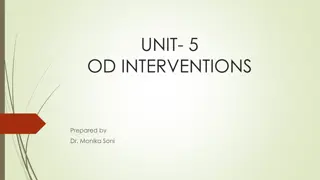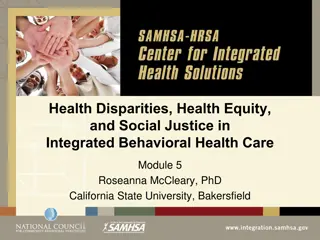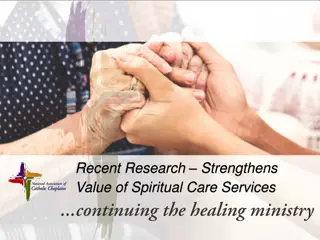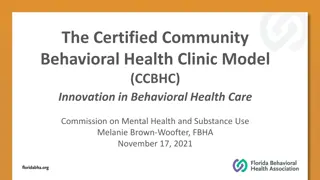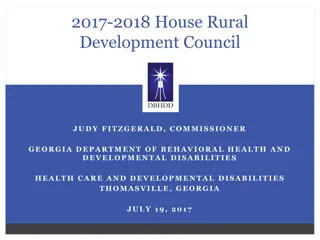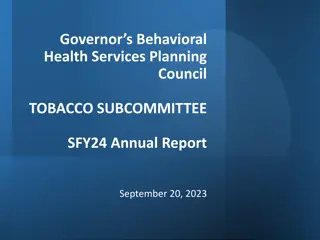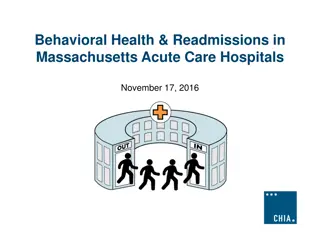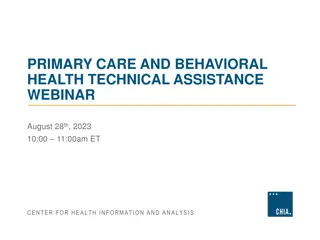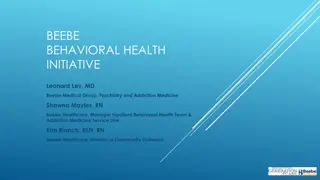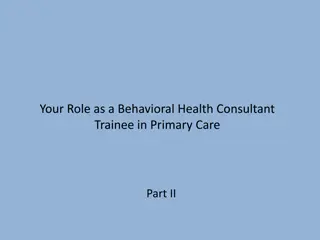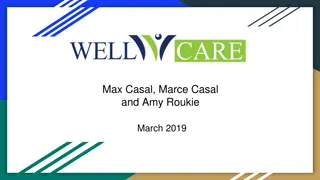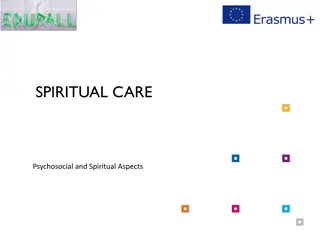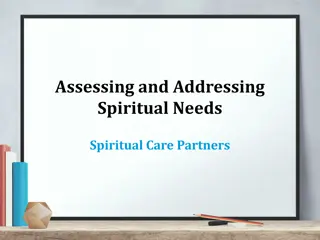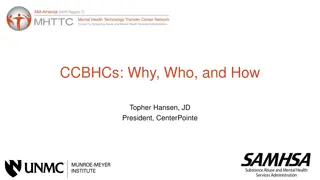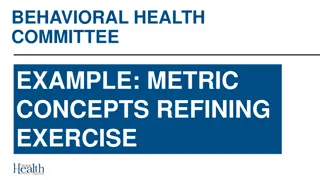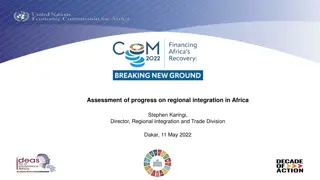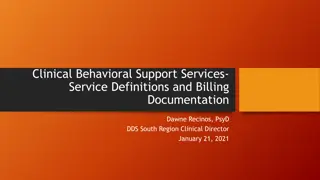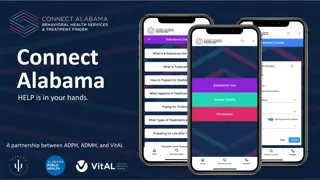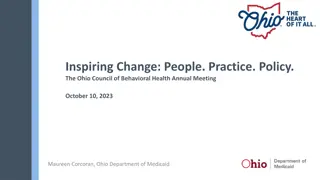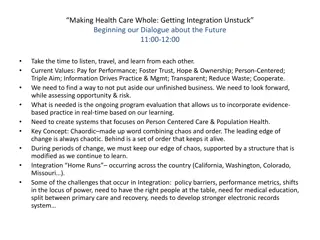Spiritual Care Integration in Behavioral Health Organizational Challenges
This document outlines organizational challenges related to integrating spiritual care in behavioral health, highlighting the prevalence of mental illness, barriers to accessing care, and the need for consistent chaplain support. It also discusses an applied learning project focused on addressing the unmet spiritual needs of patients and aligning with Catholic healthcare values.
Download Presentation

Please find below an Image/Link to download the presentation.
The content on the website is provided AS IS for your information and personal use only. It may not be sold, licensed, or shared on other websites without obtaining consent from the author. Download presentation by click this link. If you encounter any issues during the download, it is possible that the publisher has removed the file from their server.
E N D
Presentation Transcript
Empowerment Model for Spiritual Care Integration in Behavioral Health Rev. Rachel Daley, BCC
Organizational Challenge Spiritual Care in Response to Behavioral Health Concerns Prevalence: 1 in 5 U.S. adults experience mental illness each year Comorbidity between mental and medical conditions is the norm Barriers limit access to behavioral health care Health disparities particularly impact vulnerable populations This Photo by Unknown Author is licensed under CC BY-ND Religion and spirituality are generally supportive but can also negatively impact mental health Interactions between r/s and mental health require nuance and sensitivity 3
Organizational Challenge Behavioral Health Needs in Community Hospital Shift in inpatient volumes toward Behavioral Health Approximately half of inpatient volume hospitalized in Behavioral Health units Significant comorbidity of BH concerns and social barriers in all patient care settings 4
Organizational Challenge Behavioral Health Needs and Challenges to Chaplain Practice Inadequate resources to support spiritual needs of patients and associates in inpatient Behavioral Health Inconsistent chaplain competence and experience in Behavioral Health 5
Applied Learning Project Spiritual Care Integration in Behavioral Health Significant unmet spiritual need among patients and associates Address disparity between needs and resources Align with values as Catholic healthcare, provide holistic support and attend to needs of the poor and vulnerable
Applied Learning Project Spiritual Care Integration in Behavioral Health Desired Outcomes Shift in resource allocation Unit-integrated chaplain to provide consistent presence and associate support Chaplain education for increased competence Improved chaplain practice and care
Progress 9
Applied Learning Project Evaluating Resource Allocation Unit Assessment Process Collect data about volume and acuity Unit assessment form to solicit chaplain input about coverage needs Presented data in a series of individual and team conversations Shift in FTE resources toward BH Tradeoff in terms of palliative care collaboration
The Behavioral Health Empowerment Model Curriculum development Innovation and advocacy Chaplain education and research BH Leader Integrate with BH IDT and provide associate care Facilitate groups Respond to complex BH needs BH Chaplain Practitioner Provide compassionate care for BH needs of patients and associates in all settings BH Informed Chaplain 11
Behavioral Health Informed Chaplain Who All chaplains and CPE students Leader Knowledge Base Conceptualize and communicate about mental illnesses and symptoms using medical model Understanding of basic behavioral health concepts: depression, trauma, suicidality How to promote safety of patient and chaplain and provide appropriate resources Practitioner Informed Chaplain Progress Focused Behavioral Health Orientation Interview and Hiring Process 12
Behavioral Health Practitioner Who Chaplains who consistently work in BH unit Leader Knowledge Base Understanding of mental illness and appropriate individual/group spiritual care interventions for acute behavioral health needs Practitioner Progress Identify chaplains with skill and interest and develop competence through education, shadowing, mentorship and peer support Shift to team-based clinical approach Quality improvements to group materials CPI training for Chaplain Practitioners Informed Chaplain 13
Behavioral Health Leader Who Experienced chaplains working in Behavioral Health and with leadership capabilities Leader Knowledge Base Best practices in providing Spiritual Care in Behavioral Health settings Mentor and coach chaplain peers in developing BH competence Practitioner Progress Develop relationships with Behavioral Health leaders Education for Nursing Students Curriculum Development Informed Chaplain 14
Key Learnings Empowerment as a Model for Chaplain Specialization Leader Model reflects a framework for thinking about chaplain skill and competence Chaplains need basic competence in critical areas and working with diverse populations Framework to understand skills and competence and to recognize expertise and leadership Chaplain Leaders support the clinical practice of all chaplains Chaplain Practitioner Informed Chaplain 16
Key Learnings Need for Ongoing Cultural Change Spiritual Care Normalize Behavioral Health as an area of chaplaincy care Behavioral Health Integrate Spiritual Care in Behavioral Health settings Institution Address institutional stigma to support dignity of all 17
Key Learnings Ascension Housing and Health Alliance Stable housing and support services for individuals impacted by substance use, housing insecurity and chronic illness: Bonaventure House The Harbor Bettendorf Place Community Housing For questions, conversation or additional resources contact rachel.daley@ascension.org 18




